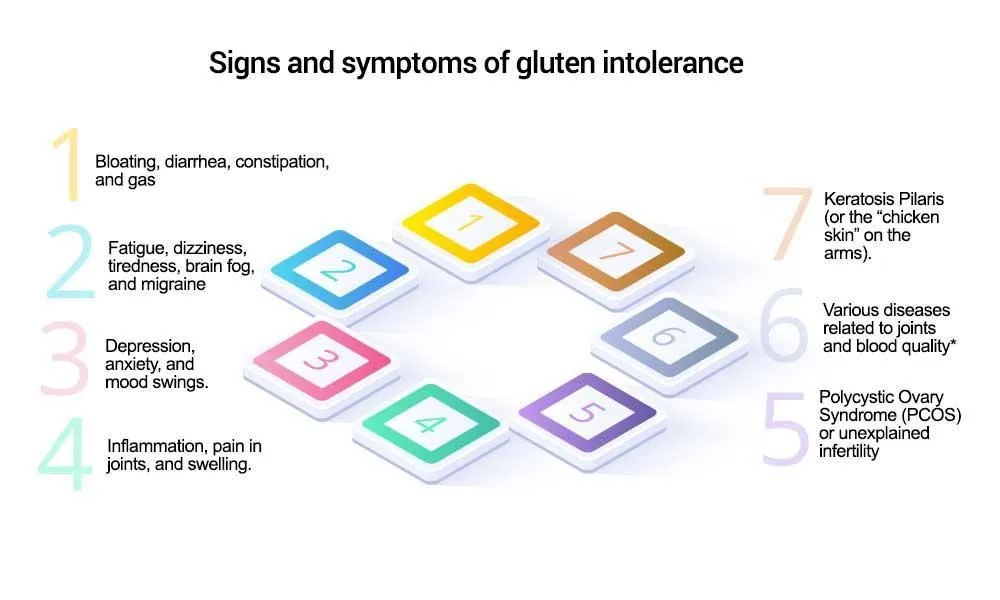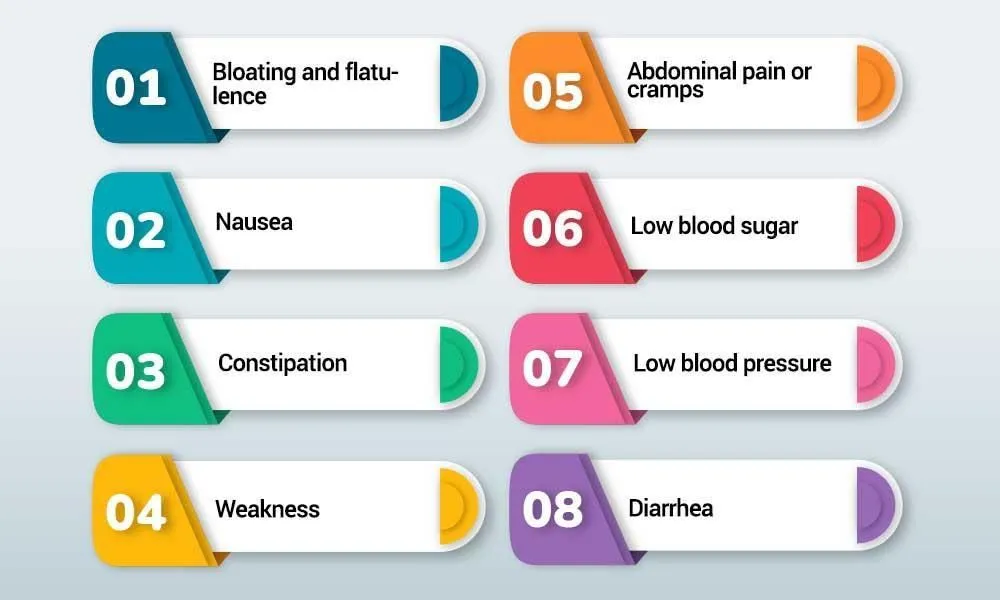It is estimated that gluten intolerance affects 15% of the US population, with 99% of those affected never diagnosed. Research shows that at least 55 diseases are linked to gluten, with celiac disease leading the ranks. More than two million residents suffer from this disease and here’s why consulting a professional nutritionist early is your best bet.
Gluten Intolerance is the name given to an allergic or autoimmune disorder in the human body caused by eating foods high in gluten (a wheat-based protein). This disease affects the inner lining of the small intestines. This may leave the patient feeling bloated and nauseated, and stomach pain and body cramps may follow.
It can also cause long-term harm if triggering factors are not controlled early. Our wellness experts believe that prevention is indeed better than cure for this serious health issue. The best way to stay from this disease is to avoid wheat-based and gluten-based foods, and then go for medications to deal with the complications.
Gluten is a unique type of protein that is found in cereal grains like wheat, rye, and barley. It is what makes the bread coarse and spongy, gives the pizza dough its elastic texture, and thickens soups and sauces. It is composed of two proteins: glutenin (a glutelin protein) and gliadin (a prolamin protein).
This unique protein can be made of wheat, rye, and barley. If you are allergic to any of them, you should go with gluten-free foods that are made of millet, sorghum, brown rice, wild rice, buckwheat, quinoa, oats, and polenta in your diet. This would help you a great deal in resisting allergies.
Bloating, diarrhea, constipation, and gas
Fatigue, dizziness, tiredness, brain fog, and migraine
Depression, anxiety, and mood swings.
Inflammation, pain in joints, and swelling.
Keratosis Pilaris (or the “chicken skin” on the arms).
Various diseases related to joints and blood quality*
Polycystic Ovary Syndrome (PCOS) or unexplained infertility
We encourage you to check out this free resource to know how and why you should go for fiber instead of gluten. Going in for quinoa, chia seeds, fruits, and oatmeal is a good way to start too but you should consult a virtual doctor for the best results (and a personalized diet plan).
*Includes health issues like rheumatoid arthritis, lupus, multiple sclerosis, ulcerative colitis, psoriasis, or Hashimoto’s thyroiditis.
Yes. This health issue may also manifest itself as an allergic reaction on various parts of the body, especially the skin. The patient may experience rashes and discoloration in their skin after eating food that contains wheat-based proteins.
If you are intolerant to gluten and other wheat-based proteins, it means that your body cannot digest them. This would lead to indigestion and various related symptoms like bloating and nausea. If you continue to consume these allergens, you might harm your digestive system beyond repair.
You should not eat any food that contains wheat or wheat-based proteins. This includes beer, bleach flour, bran, semolina, hydrolyzed vegetables, faro, triticale, cola drinks, fast foods, packaged oats, bread, and tortillas. Even rye and barley are harmful to you.
You may eat seasonal vegetables and fruits (and drink fruit juices). You may also have potatoes, gluten-free grains, dry fruits, fish, chicken, milk, curd, and yogurt.
The best way to determine if you are suffering from gluten sensitivity is to go on an elimination diet to remove gluten from your diet for at least three weeks. Once you have gone through the period without consuming this protein, you would have developed it into a habit.
It is important to understand how you feel after eliminating this wheat-based protein from your diet. If you think that you are better off without it, it means that your digestive system is not too happy with you going with this protein.
Note: Gluten is a large protein and it can take months, or even years, to completely clear it out of your body. The longer you can keep it out of your diet, the better. You may switch to Keto or Mediterranean diet for the best results.
The best way to treat gluten intolerance is to eliminate all toxins from your diet, including those you are allergic to. Some traces of gluten are also found in medications and health supplements too, and you should stay cautious about what you are eating at home or outside.
Tip: Starting your day with a cup of green or herbal tea will detoxify your intestines.
This is an important comparison to make.
Gluten intolerance may cause short-term indigestion, bloating, and stomach pain. It can be treated with medication and healthy eating practices.
Celiac disease is an autoimmune disease and its effect is much worse. The person’s immune system will “think” that the eaten food is poisonous and that it has affected blood cells. In such a case, the immune system will start damaging the inner lining of the small intestine where the food is.
With more acids created in the process, it will lead to discoloration in the skin and lots of pain. The patient may also get diarrhea, osteoporosis, and anemia in severe cases. This disease cannot be cured through medicines but may only be avoided by staying away from the allergens.
The fruit sugar is a naturally occurring complex sugary compound. It is found in honey, fruits, vegetables, and sweet potatoes. The inability of the digestive system to break down and absorb fructose causes bloating, abdominal pain, and diarrhea.
This autoimmune disorder is called fructose intolerance. It is a rare autosomal recessive failure of your digestive system that may be developed in the later stages of life. It is caused by the body’s inability to produce an enzyme called Aldolase B. This enzyme is produced by the gene called ALDOB.
PS: Changes in the DNA and ALDOB gene may cause this autoimmune disease to be passed on from one generation to another, thus making it hereditary.
Fructose (also called fruit sugar) is a plant-based ketonic monosaccharide compound. It is mostly found as disaccharide sucrose, a simple type of sugar that is soluble in water. This sugar-based compound is directly related to the levels of blood sugar in the human body because it is absorbed directly into the blood during the digestion of food.
However, its excess can quickly reduce the functioning of blood lipids and affect the nervous system adversely. It may also raise bad cholesterol levels (LDL), thus clogging the arteries by the accumulation of fat. This compound may also spike up the uric acid in the bloodstream, thus causing gout and kidney-related diseases.
Is there fructose in gluten?
Yes but not always.
One might mistake one’s intolerance or hypersensitivity to fructose for gluten. Some of its polymers are called fructans and are often found in wheat, fruits, vegetables, and legumes. It is better to know what triggers reactions in your body before concluding anything.
The symptoms of fructose intolerance are nearly just the same as those of gluten intolerance because they both affect our digestive system. The only difference between them is the kind of food that is being taken, and it is about eating natural sugar in the case of fructose intolerance.
Here are the symptoms of this autoimmune disease:
Bloating and flatulence
Nausea
Constipation
Weakness
Abdominal pain or cramps
Low blood sugar
Low blood pressure
Diarrhea
Many studies highlight that sugary beverages lead to weight gain. These studies have considered the impact of glucose and fructose together since there was a lack of resources that would help in standardizing the diets of thousands of participants.
Such high-calorie drinks cause spikes in blood sugar levels and may lead to rapid weight gain. They are extremely high in empty calories, don’t make you feel full, and can make you eat more for the calories by eating less. They also dehydrate you and cause a tremendous load on the kidneys.
To get the actual results of fructose versus glucose, scientists collected detailed data from 24 healthy adult participants. There was a study conducted in which scientists randomly assigned participants a 10 oz liquid containing either 2 oz of fructose or glucose.
The analysis was done for the data collected both before and after the participants sipped their sweet drinks. Volunteers were asked to fast both times before having the drinks and follow the same exercise and dietary patterns to create a uniform testing environment.
The results of the study were that the participants reported their hunger and desire to eat decreased after both fructose and glucose drinks. Along with these participants’ brain scans and food choices highlighted that:
Blood insulin levels and blood sugar were higher in glucose drinkers than fructose drinkers. This wasn’t welcome news because moderately higher insulin and blood sugar levels help our body feel more satiated and thus help us stay away from unhealthy eating practices.
Participants who had fructose responded faster to food pictures as compared to those who had glucose. This suggests that participants may be more motivated to eat after a dose of fructose.
Fructose drinkers were more likely to choose food over a delayed money reward compared to glucose drinkers. This implies that after drinking fructose people can subconsciously pick immediately calorie-gratifying choices over long-term benefits.
Fructose and glucose affect us differently but we rarely eat them in isolation. Since pure fructose isn’t good for our health, the best way to reduce its intake is to eat less added sugar. This will also help you reduce higher levels of blood sugar in your bloodstream, thus controlling diabetes.
Fruits are a natural source of valuable antioxidants, natural sugar, phytochemicals, and vitamins C, A, folate, and many other nutrients. Eating fruits and vegetables can conclusively lower your risk for heart diseases, diabetes, and cancer.
Both these autoimmune disorders can lead you to a lot of discomfort and pain, not to mention the impediments that you could face in your daily life. We thus recommend checking with a virtual healthcare expert for the best results.
You may dial up MevoLife to connect with some of the best experts in the world, as and when you’d like. These audio- or video-based sessions are available to you at a fraction of the fees that you’d be paying to your local healthcare experts.



